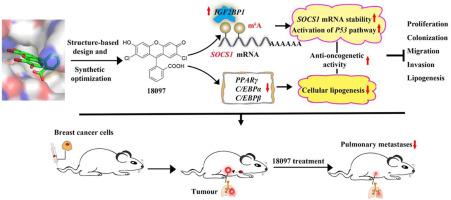Acta Pharmaceutica Sinica B ( IF 14.5 ) Pub Date : 2021-08-31 , DOI: 10.1016/j.apsb.2021.08.028 Guoyou Xie 1 , Xu-Nian Wu 1 , Yuyi Ling 1 , Yalan Rui 1 , Deyan Wu 1 , Jiawang Zhou 1 , Jiexin Li 1 , Shuibin Lin 2 , Qin Peng 3 , Zigang Li 3 , Hongsheng Wang 1, 3 , Hai-Bin Luo 1, 4

|
N6-methyladenosine (m6A) modification is critical for mRNA splicing, nuclear export, stability and translation. Fat mass and obesity-associated protein (FTO), the first identified m6A demethylase, is critical for cancer progression. Herein, we developed small-molecule inhibitors of FTO by virtual screening, structural optimization, and bioassay. As a result, two FTO inhibitors namely 18077 and 18097 were identified, which can selectively inhibit demethylase activity of FTO. Specifically, 18097 bound to the active site of FTO and then inhibited cell cycle process and migration of cancer cells. In addition, 18097 reprogrammed the epi-transcriptome of breast cancer cells, particularly for genes related to P53 pathway. 18097 increased the abundance of m6A modification of suppressor of cytokine signaling 1 (SOCS1) mRNA, which recruited IGF2BP1 to increase mRNA stability of SOCS1 and subsequently activated the P53 signaling pathway. Further, 18097 suppressed cellular lipogenesis via downregulation of peroxisome proliferator-activated receptor gamma (PPARγ), CCAAT/enhancer-binding protein alpha (C/EBPα), and C/EBPβ. Animal studies confirmed that 18097 can significantly suppress in vivo growth and lung colonization of breast cancer cells. Collectively, we identified that FTO can work as a potential drug target and the small-molecule inhibitor 18097 can serve as a potential agent against breast cancer.
中文翻译:

一种新型 N6-甲基腺苷脱甲基酶 FTO 抑制剂可诱导 mRNA 甲基化并显示出抗癌活性
N 6 -甲基腺苷 (m 6 A) 修饰对 mRNA 剪接、核输出、稳定性和翻译至关重要。脂肪量和肥胖相关蛋白 (FTO) 是第一个确定的 m 6 A 去甲基化酶,对癌症进展至关重要。在此,我们通过虚拟筛选、结构优化和生物测定开发了 FTO 小分子抑制剂。结果鉴定出两种FTO抑制剂18077和18097,它们可以选择性地抑制FTO的去甲基化酶活性。具体来说,18097与FTO的活性位点结合,从而抑制细胞周期过程和癌细胞的迁移。此外,18097 对乳腺癌细胞的表观转录组进行了重编程,尤其是与 P53 通路相关的基因。18097增加m丰度图6细胞因子信号通路抑制因子 1 ( SOCS1 ) mRNA 的修饰,它募集 IGF2BP1 以增加SOCS1的 mRNA 稳定性并随后激活 P53 信号通路。此外,18097通过下调过氧化物酶体增殖物激活受体 γ ( PPARγ )、CCAAT/增强子结合蛋白 α ( C/EBPα ) 和C/EBPβ来抑制细胞脂肪生成。动物研究证实18097在体内能显着抑制乳腺癌细胞的生长和肺定植。总的来说,我们发现 FTO 可以作为潜在的药物靶点,而小分子抑制剂 18097 可以作为潜在的抗乳腺癌药物。


























 京公网安备 11010802027423号
京公网安备 11010802027423号